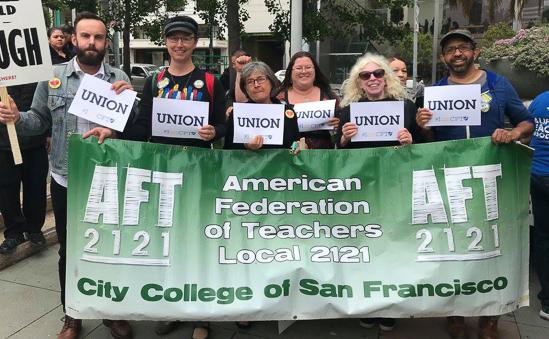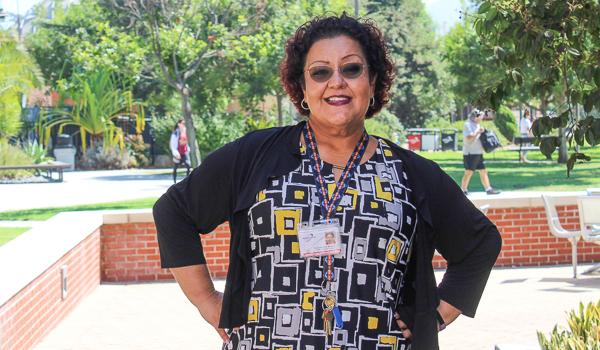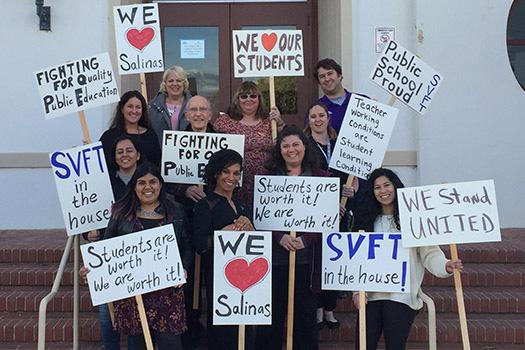Supreme Court’s Janus decision barely ripples through classified locals
No one was surprised when the Janus decision from the U.S. Supreme Court came down over the summer. In the months since then, however, locals across California have defied predictions of a mass exodus of dues-paying members. In fact, after two years of recruiting new employees and convincing agency fee payers to join, union ranks are growing.
Part-timers are still sticking with their union
On June 27, the storm clouds were gathering. The Janus v. ASFCME decision had just come down from the U.S. Supreme Court in a 5-4 ruling, overturning 40 years of legal precedent and marking the abrupt end of union fair share, or agency fee, for public employees.
Now non-union members who benefit from the hard work of unions who still represent them at the bargaining table would no longer be required to pay their fair share.
CFT members step up to the plate following Janus v. AFSCME decision
On June 27, the U.S. Supreme Court overturned decades of precedent and eliminated the right of public sector unions to collect fair share, or agency fees, from non-members.
The justices ruled 5-4 in favor of Mark Janus, an Illinois fee payer, in Janus v. AFSCME Council 31, overturning the 1977 precedent established in Abood v. Detroit Board of Education. Those backing the case clearly hoped the decision would cripple union operations, but with so much at stake for educators and public education, CFT members have not only chosen to stay united but have gained in strength as a result.
The Janus decision is an attack on our voice and on public education
This morning in a 5-4 ruling the U.S. Supreme Court decided in favor of Mark Janus in the Janus v. AFSCME Council 31 case. The ruling overturns decades of precedent and eliminates the ability of public sector unions to collect fair share, or agency fees.
Workplace organizing: Facing new threat, members recommit to their unions
For years, the conservative majority on the U.S. Supreme Court threatened to clip unions’ wings if the right case came before the bench.
Classified AFT locals across California have been preparing for the decision in Janus v. AFSCME by asking agency fee payers to become full members, and recruiting at new employee orientations. The membership drives have meant an influx of new enthusiasm and a renewed sense of union pride.
Delivering for the union: Signing up new members one stop at a time
Driver and local president Albert Lopez moves between 13 campuses
The Riverside County community of Menifee is on the upswing. More than 1,000 new homes are under construction, new businesses are opening their doors, and new families are moving in. The Menifee Union School District sees increased enrollment on the horizon. The Menifee Council of Classified Employees is also expanding. In fact, the CFT recently honored the local for placing second in two categories recognizing member growth: most new members (151) and highest rate of growth (42 percent).
Supreme Court set to rule against union ‘fair share’
Conservatives launch another attack on workers, unions, democracy
Quick download: FAQ about Janus v. AFSME (pdf, 2pp)
What will the court decide?
The lawsuit Janus v. AFSCME asks the U.S. Supreme Court to decide whether public sector unions may continue to charge non-members in a workplace represented by the union a fee (“agency fee” or “fair share”) equal to the cost of representing them. The court’s ruling is expected early next year.
Tried and true methods: Union organizing begins in the workplace
By Joshua Pechthalt, CFT President
We learned in the final days of September that the U.S. Supreme Court will take up another union fair share case. With the court’s ruling coming early next year, it feels like we are on a ship with an iceberg rapidly approaching. Fortunately, as we prepare for an unfavorable decision in the Janus v. AFSCME case, we had already prepared for the similar Friedrichs v. California Teachers Association case.
Members unite to fight Trump’s immigration orders
Council builds solidarity by engaging with members on issues that unite
Before the election our focus was on leadership development,” says Mia McIver, vice president for organizing for the University Council-AFT, “and the election brought us a sense of new urgency.” Strong leaders will provide the underpinning for the campaigns the union will undertake as it faces the Trump administration and a predictable tsunami of anti-union and anti-education measures.
Victory! Courts reject conservative anti-union lawsuits
Attacks on educator rights and union fair share halted…for now
On April 14, the California Court of Appeals unanimously
overturned the lower court’s decision in the Vergara v.
California case. The suit sought to dismantle seniority and due
process rights for teachers in the name of students’ equal access
to education. The appellate court wisely ruled that there is no
constitutional link between tenure and student performance.
The lawsuits that educators and unions must defeat
Special Report by Joshua Pechthalt, CFT President
Education unions and public sector unions are facing legal attacks designed to destroy our ability to represent our members. Not surprisingly, these cases are supported by the usual anti-union law firms and wealthy backers. What follows is a snapshot of the cases CFT and other unions are now fighting.
One by one: Organizing team signs up part-time faculty
Why does anyone join the union? …because someone asks them
Member organizers from local unions throughout the state joined forces at Palomar College to meet one-on-one with part-time faculty agency fee payers who had not yet signed their union cards — and asked them to join the union.






